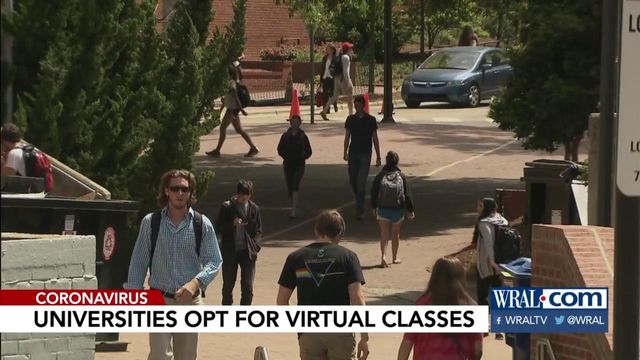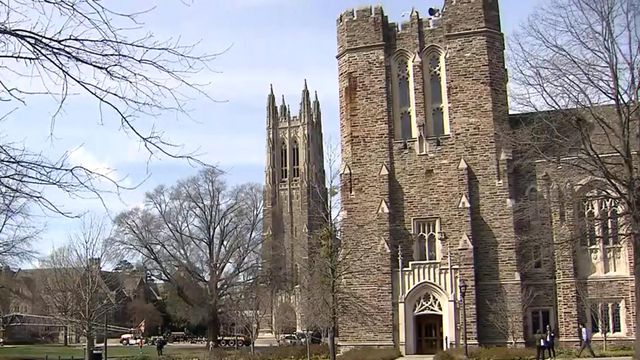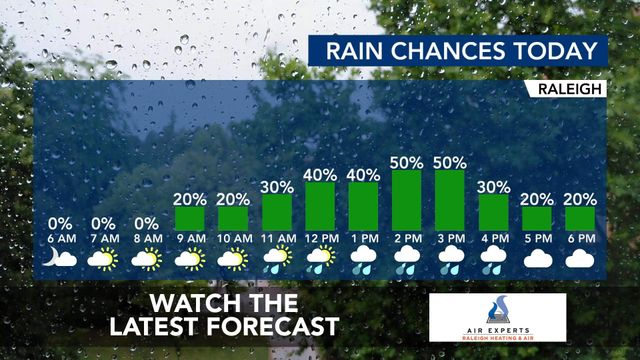UNC system shifts most classes online to combat coronavirus
The University of North Carolina system will halt most in-person classes at all of its campuses by the end of next week to limit the spread of the new coronavirus, officials said Wednesday.
Officials said online courses and independent study would begin March 23.
"Our goal is to return to in-person instruction as soon as reasonably possible. Each institution will communicate the specific details to its students and faculty," officials said in a statement.
Officials at each campus will determine which classes, such as those with labs, will continue to require in-person instruction and attendance.
"I'm hoping there is like two weeks of online learning and we can go back to normal," UNC-Chapel Hill student Clair Cote said. "I’m here for a reason – to have in-person classes."
The UNC campuses also have suspended all university-sponsored travel outside of North Carolina and gatherings of 100 or more people.
The move comes a day after Duke University took similar steps to combat coronavirus, which has infected seven people in the Triangle, more than 1,000 nationwide and 100,000 globally. The World Health Organization has declared the virus a pandemic.
Students at Duke, UNC-Chapel Hill and North Carolina State University are currently on spring break, and officials at all three campuses have extended break an extra week, through March 22. Duke and UNC-Chapel Hill have told students not to return to campus after that, while N.C. State said anyone returning to campus after the break will have to complete a form letting officials know where they have been, in case any virus-related quarantine is needed.
Duke junior Rachel Helman has remained on campus during the break and said Wednesday that she doesn't want to go home to rural Oregon, saying she would be less safe there.
"I was very stressed about if I have to go home. How will I pay for the flights? I’m on financial aid," Helman said. "If I have to go home, what am I going to do? I’m from a farm in the middle of nowhere."
She pointed out Oregon has more coronavirus cases than North Carolina, and she would have access to better medical care at Duke.
Duke Vice President Mike Schoenfeld said that, while most students are encouraged to go home and not return to campus, there are exceptions.
"If you’re not on campus now and you have a home to go to, then you should go there," Schoenfeld said. "This is an effort to reduce significantly, to the extent possible, the risk of exposure. If you are from an area where there would be a greater risk to go there than to come here, then we’ll work with you."
Students who have financial, immigration, visa or other difficulties that would make it hard to go home can register with Duke and remain on campus, he said.
The extra week of spring break will give professors time to adjust their lessons to be delivered outside of a classroom.
"One thing I really want to work on is making sure that all the students are engaged and participating," said journalism professor Bill Adair, who noted he's never taught an online class. "With a big class, I think I’m going to have to find creative ways to do that."
"We are committed to completing the semester and ensuring that all students can complete their academic requirements at the level that they would be expected," Schoenfeld said.
Even without students on campus, Duke employees will continue to be paid, he said, although some whose duties are directly affected may be reassigned.
Businesses near campus will likely see a prolonged dip in their revenue, however.
Wavelengths Hair Salon has been in the same spot on Ninth Street in Durham for 26 years, and owner Sherry Clayton said Duke students make up about a third of her business.
"We feel their absence anytime they go home for spring break, when they go home for Christmas," Clayton said. "I think it’s going to affect everyone."
Owners of The Regulator book store, Happy and Hale and Vin Rouge restaurants and Vaguely Reminiscent gift store agreed that the impact on their bottom lines will be noticeable.
"Having less people and less traffic is always going to impact," said Karen Merowchek, a manager at Vaguely Reminiscent. "It’s just a matter of time as to when and how much, and nobody knows that."
Schoenfeld said Duke officials didn't take their decision to effectively shut down campus lightly.
"We recognize that, between students and the literally thousands of events that are scheduled to be held on the Duke campus and around the Duke campus and sponsored by Duke, that there will be an economic impact, as there will be statewide as this continues," he said.
In addition to halting in-person classes, the university has canceled all events where at least 50 people are expected through April 20.
Schoenfeld wouldn't hazard a guess at the fate of graduation in mid-May, which is an annual economic driver for Durham.
"I couldn’t predict that we’d be here today four days ago," he said. "I'm not going to make any predictions about something that is happening two months from now."
Elon University plans to shift to online classes for two weeks, beginning at the end of spring break on March 23, Students are urged not to return to campus during that time.
Campbell University has no current plans to move classes online, but officials noted that a few students are in quarantine after one of them went to the student health center with possible cononavirus symptoms. That student has been tested, and officials are awaiting the results.













